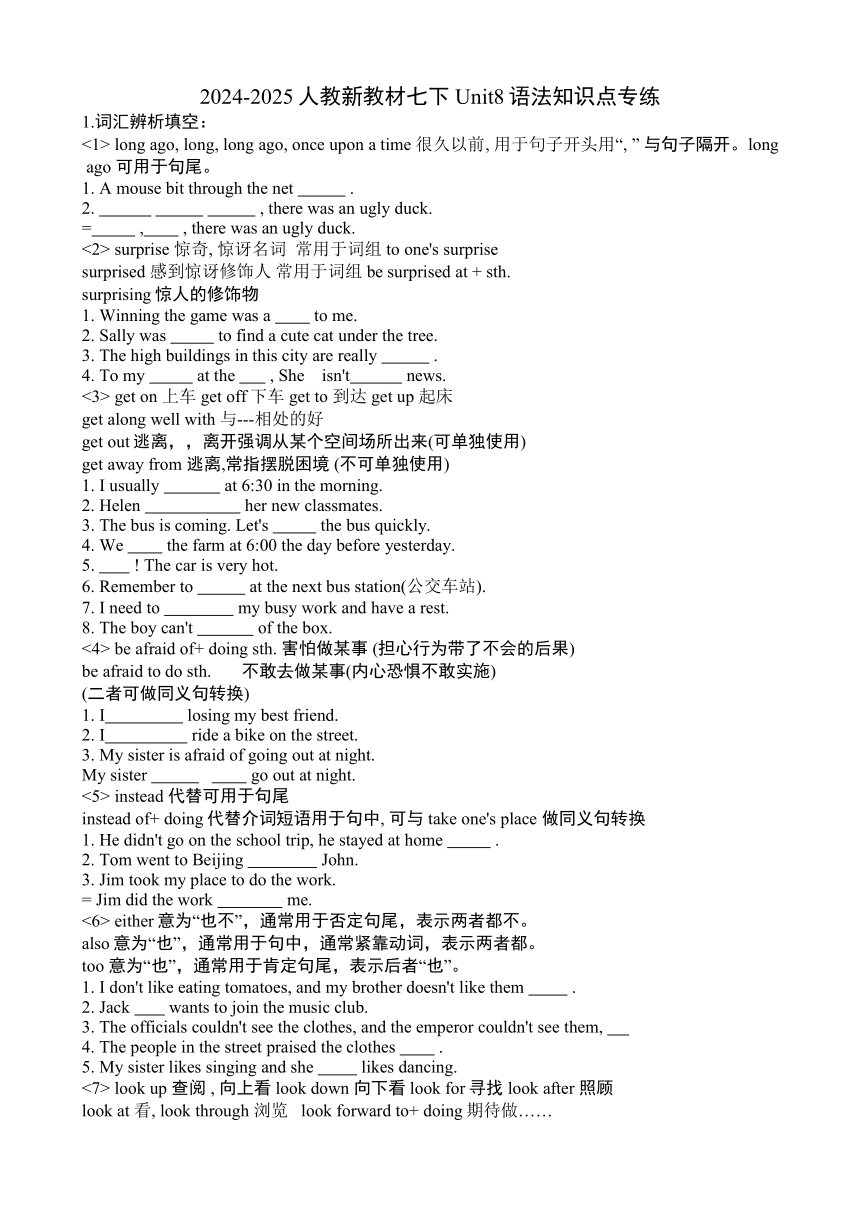
2024-2025人教新教材七下 Unit8语法知识点专练 1.词汇辨析填空: <1> long ago, long, long ago, once upon a time 很久以前, 用于句子开头用“, ” 与句子隔开。long ago 可用于句尾。 1. A mouse bit through the net . 2. , there was an ugly duck. = , , there was an ugly duck. <2> surprise 惊奇, 惊讶名词 常用于词组 to one's surprise surprised 感到惊讶修饰人 常用于词组 be surprised at + sth. surprising惊人的修饰物 1. Winning the game was a to me. 2. Sally was to find a cute cat under the tree. 3. The high buildings in this city are really . 4. To my at the , She isn't news. <3> get on 上车 get off下车 get to 到达 get up 起床 get along well with 与--相处的好 get out逃离,,离开强调从某个空间场所出来(可单独使用) get away from 逃离,常指摆脱困境 (不可单独使用) 1. I usually at 6:30 in the morning. 2. Helen her new classmates. 3. The bus is coming. Let's the bus quickly. 4. We the farm at 6:00 the day before yesterday. 5. ! The car is very hot. 6. Remember to at the next bus station(公交车站). 7. I need to my busy work and have a rest. 8. The boy can't of the box. <4> be afraid of+ doing sth. 害怕做某事 (担心行为带了不会的后果) be afraid to do sth. 不敢去做某事(内心恐惧不敢实施) (二者可做同义句转换) 1. I losing my best friend. 2. I ride a bike on the street. 3. My sister is afraid of going out at night. My sister go out at night. <5> instead 代替可用于句尾 instead of+ doing代替介词短语用于句中, 可与 take one's place 做同义句转换 1. He didn't go on the school trip, he stayed at home . 2. Tom went to Beijing John. 3. Jim took my place to do the work. = Jim did the work me. <6> either意为“也不”,通常用于否定句尾,表示两者都不。 also意为“也”,通常用于句中,通常紧靠动词,表示两者都。 too 意为“也”,通常用于肯定句尾,表示后者“也”。 1. I don't like eating tomatoes, and my brother doesn't like them . 2. Jack wants to join the music club. 3. The officials couldn't see the clothes, and the emperor couldn't see them, 4. The people in the street praised the clothes . 5. My sister likes singing and she likes dancing. <7> look up 查阅 , 向上看 look down 向下看 look for寻找 look after 照顾 look at 看, look through 浏览 look forward to+ doing期待做…… 1. I have to stay at home to my little brother. 2. Some people are the lost boy in the street. 3. You can the new words in the dictionary. 4. We from the top of the mountain. 5. Everyone winning the game. 6. Please the blackboard and listen to me carefully. 7. My father the newspaper in the living room now. <8>. find意为“找到; 发现” look for意为“寻找”, 强调寻找的过程/动作 search for(search.... for)意为“搜寻”, 强调寻找的重要或特定事物证据等。 1. I my school bag under the chair just now. 2. Jim is a job at the moment. 3. They all the rooms for the key. 4. The police the thief in the supermarket yesterday. <9> the other:常指两者中的另一个, another众多中另一个 other:作形容词,意为“其他的”,后接名词复数 (不全包括) others:泛指“其他人或物”,相当于“other+名词复数”(不全包括) the other指在一定范围内除去一部分后其余的全体,后 ... ...
~~ 您好,已阅读到文档的结尾了 ~~

